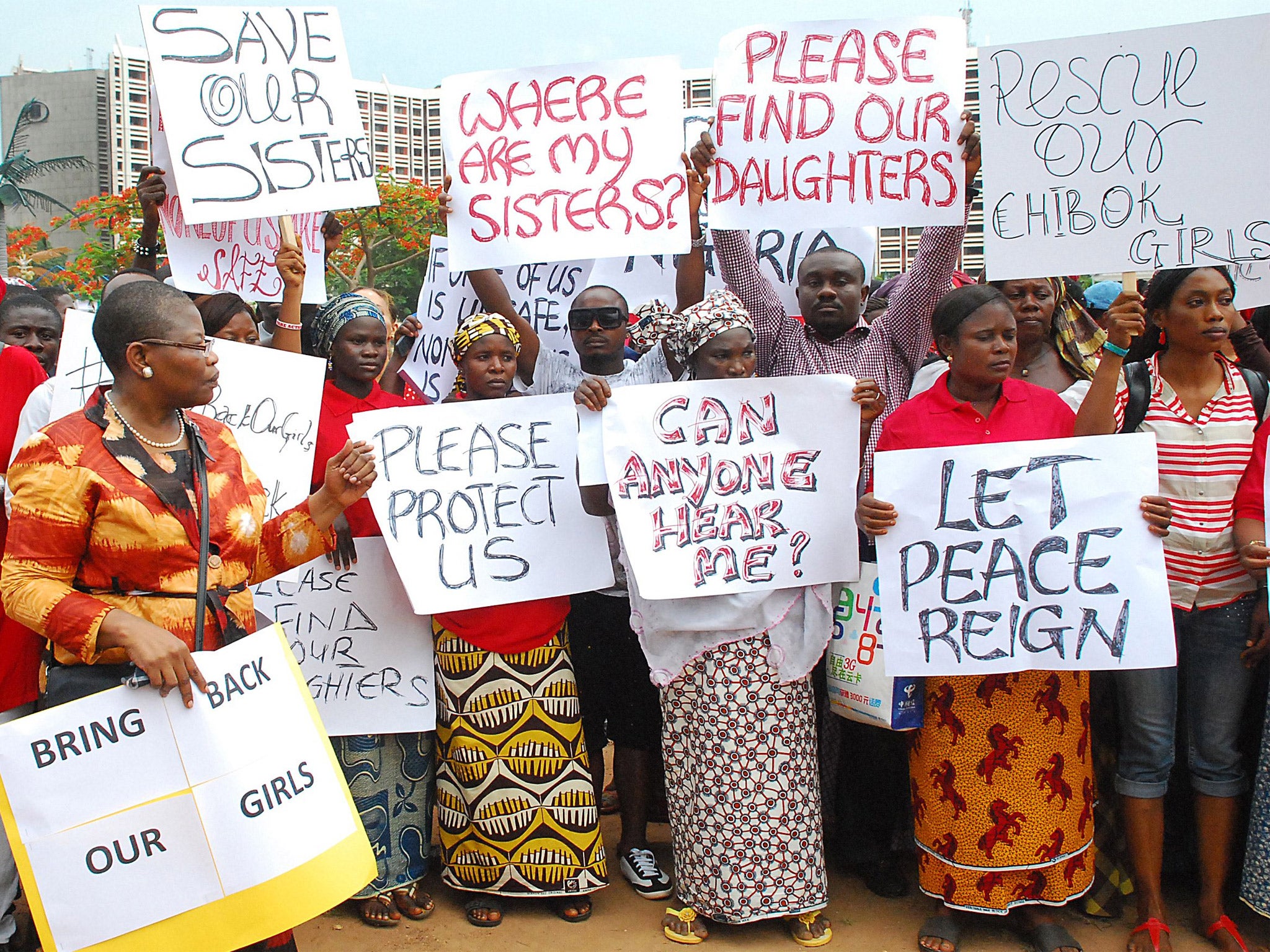Rescue them, mothers of abducted schoolgirls tell Nigerian government

Your support helps us to tell the story
From reproductive rights to climate change to Big Tech, The Independent is on the ground when the story is developing. Whether it's investigating the financials of Elon Musk's pro-Trump PAC or producing our latest documentary, 'The A Word', which shines a light on the American women fighting for reproductive rights, we know how important it is to parse out the facts from the messaging.
At such a critical moment in US history, we need reporters on the ground. Your donation allows us to keep sending journalists to speak to both sides of the story.
The Independent is trusted by Americans across the entire political spectrum. And unlike many other quality news outlets, we choose not to lock Americans out of our reporting and analysis with paywalls. We believe quality journalism should be available to everyone, paid for by those who can afford it.
Your support makes all the difference.Hundreds of Nigerians yesterday braved heavy rain to march on parliament to demand intensified efforts by the government to rescue more than 200 missing schoolgirls abducted by Islamist insurgents over a fortnight ago.
Activists had called for a “million-woman” march in the capital Abuja but turnout fell far short of that, despite massive support on social-networking sites and in the Nigerian media.
The mass kidnappings, carried out by fighters from the al-Qa’eda-inspired Boko Haram group, have stunned Nigerians largely blunted to the violence that has wracked the northeastern part of the country in the past five years.
While desperate parents have forayed into the forests where the girls are thought to have been taken, only to turn back after locals warned them the insurgents were heavily armed, the government has taken little visible action to allay the growing criticism that it is doing nothing to bring the girls home. It has even refused to provide assistance when approached by the girls’ parents for help.
The father of one of the missing girls said that parents were pinning their hopes on ordinary Nigerians, who have transcended religious and ethnic divides to draw attention to the plight of the girls, some of whom, it is believed, have already been sold as “brides” to Islamist insurgents or into sex slavery.
“We are poor with no influence whatsoever, which we believe is the reason the government does not care about our girls,” the father told the Agence France Presse on condition of anonymity.
“We believe if Nigerians, the high and the low, raise their voices from different quarters it will make the government sit up and do the right thing to free our girls.”
On the night of 14 April Boko Haram members overpowered guards at the girls’ boarding school in Chibok in the northeastern Borno State. Masquerading as soldiers, militants lured the schoolgirls, aged mainly between 16 and 18, into trucks. According to escapee’s accounts, when the armed men shouted “Allahu Akbar” it dawned on the captives that they were insurgents. Over the following days between 40 and 50 girls escaped, either by jumping from trucks or by running off when sent to wash dishes.
The precise number of missing girls has varied widely. Officials said 129 were kidnapped and initially claimed that the military had freed all but eight. That statement was later retracted. The school principal, Asabe Kwambura, said that some 220 girls remain missing. Those who escaped did so without outside help.
Boko Haram, which means “Western education is forbidden”, has conducted a grisly campaign of terror in a bid to create an Islamic state in Nigeria’s mainly Muslim north.
The group has particularly targeted schools. Last July it burned 29 students alive at a school in northern Nigeria, and this February massacred 59 schoolboys at a boarding school before razing the building to the ground.
The military, underfunded and poorly equipped, has been lambasted for its failure to rein in Boko Haram and particularly for appearing to do little in the search for the girls, even though their location has at times been identified.
The girls’ parents warn that if the government does not act soon, their daughters could become untraceable. Locals in Chibok say they have tracked the movements of the girls, and believe that most of them were taken across the border into Chad and Cameroon where some have been sold as wives to Islamist fighters for 2,000 naira (£8).
“Some of them have been married off to insurgents. A medieval kind of slavery. You go and capture women and sell them off,” Chibok community elder Pogu Bitrus told the BBC Hausa Service.
The case is eerily reminiscent of a similar abduction in northern Uganda in 1996, when some 140 girls were snatched from their dormitories by the Lord’s Resistance Army, which is fighting for a state based on the Biblical Ten Commandments. The release of 109 was later secured.
Join our commenting forum
Join thought-provoking conversations, follow other Independent readers and see their replies
Comments